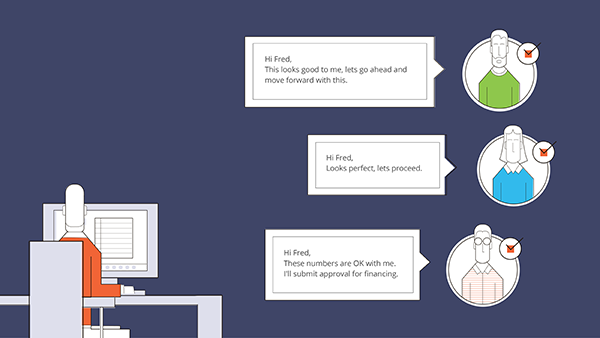One of the worst elements of the modern working world is the approval process vortex, which comes about from a host of interconnected factors. It’s probably helpful to start with a definition of what, exactly, this approval process vortex is.
Example A: you’re working on a project. You ultimately need to move to the approval process stage, where it’s less planning and more execution. En route to the approval process, your boss asks 91,783 ridiculous questions and makes a series of line edits that make little to no sense. Everything is ‘process for the sake of process;’ in short, your boss wants to feel in control. Because of this elongated approval process, the eventual results may be questionable. We often feel (or tell ourselves) that we’re extending approval process to get the best possible result/product out the door, but often times it’s just to make us feel more relevant about our role at work.
Example B: your team works on a big project and presents it to your boss. Your boss says “This is great!” He/she then explains it’s going up to the department VP to continue the approval process. “This is an urgent priority,” your boss notes, “so we should be moving on this by next week.” Since everyone knows ‘sense of urgency’ is the oldest managerial trick in the book, here’s what happens. Six months later, you haven’t heard a peep about the project. Priorities have shifted. We’re chasing new rainbows and revenue streams.
[Tweet “How often are your projects sucked into an approval process vortex?”]
Those are two primary examples of the approval process vortex. How does this stuff happen? It’s elementary, really.
The approval process vortex basics: How we approach work
As noted above a little bit, most of work is about (a) proving your relevance and (b) not being seen as incompetent. That’s why we want to be “busy.” It achieves both, even if we’re not actually being productive. It’s also why we focus so much on the quantity of work we do. Having a lot on our plate is a good thing — to most of us.
This all creates The Temple of Busy. While worshiping there, absolutely nothing can really advance that far. Decision-makers are harried — and you’re not allowed to bother them or ask for their time! Middle managers have too much on their plate! Everyone’s doing 13 different jobs! Ah! No end in sight!
You combine with this attitude with mostly-unclear priorities, and you’ve explained the approval process vortex. Everything takes time because everything has to take time, because the ‘taking time’ and ‘being busy’ is the important part to most people. It’s not the actual work.
The approval process vortex and ‘Hurry up and wait’
In reality, almost all work is ‘hurry up and wait.’ You grind on a project because of the aforementioned ‘sense of urgency.’ You submit it, and you hear a quick ‘thx’ from your boss. You then don’t hear about the project for another week. If you inquire, your boss says there’s a new urgent project. If you’re rank and file, there’s a good chance maybe 1 in 12 things you work on ever reaches a department head. Priorities shift all the time, in large part because they didn’t make sense to begin with.
When I was younger, I used to pitch new ideas at jobs a lot. As I got older and realized how most companies work — top-down hierarchy is everything — I stopped doing that as much. At a recent gig I had, I had pretty much given up on anything new. I was just going through motions and checking boxes. I casually mentioned a concept to someone higher up the chain than me one day over beers. 2 days later, I had a series of e-mails from higher-ups asking me questions. They thought, potentially, my idea was a new revenue stream. For about 12 hours, I was buoyed. This happened on a Wednesday. By Friday, no one remembered the idea and we were all discussing a brand new thing as “the No. 1 priority.”
‘Hurry up and wait’ + consistently-shifting priorities = work in a nutshell. The approval process vortex.
Can we improve the approval process vortex?
Yes and no. We can make it better with better deadlines, better communication, and better tools. (Slack! Basecamp!) That’s all possible, sure.
But the approval process vortex is the essence of something I discuss a lot. Work is not logical. We want it to be logical, and that’s why we love to create process and protocol. But work is (still) inhabited by human beings and as a result, it’s inherently emotional.
You can’t remove the psychology from work when you try to analyze it. That’s a major flaw we often fall prey to. The approval process vortex is a function of psychology: people need to feel busy. People need to believe their time matters more than yours. People need to give you reams of criticism in the name of ‘perfection.’ These things need to happen for many people to take purpose and competency from their day-to-day work.
That’s what creates the approval process vortex. So can you solve it with better Trello boards and harder deadlines? You can make it better. But you can’t solve it, no.
Seen the approval process vortex in your jobs? Any ideas/thoughts on it?

Absolutely and now find patronising positivism in face of a. starkly negative culture, burnout and workplace stress being used as a tool by hierarchical maangers to keep the vortex healthy and suppress initiative A colleague calls it duncing and I have noticed its use more and modre as a way of isolating plants, people developers & innovators.